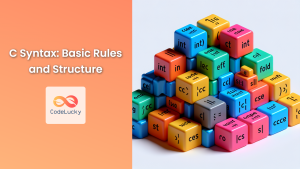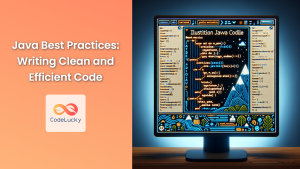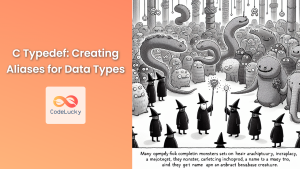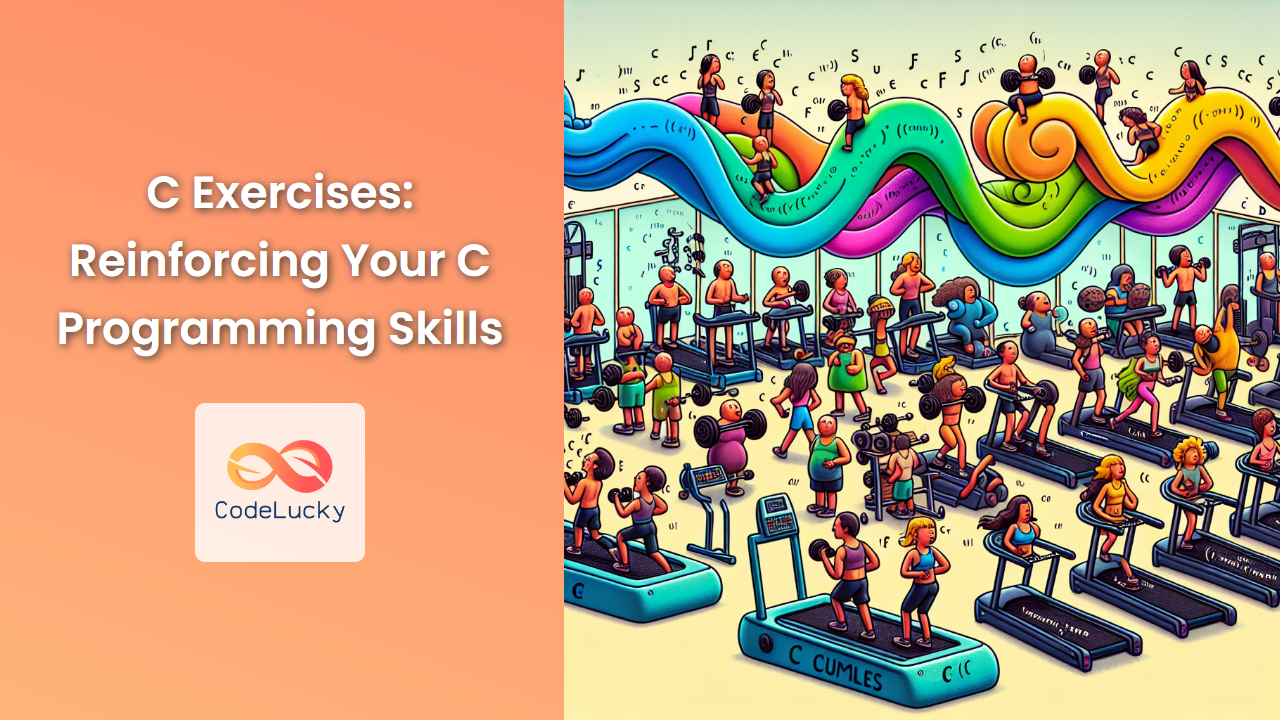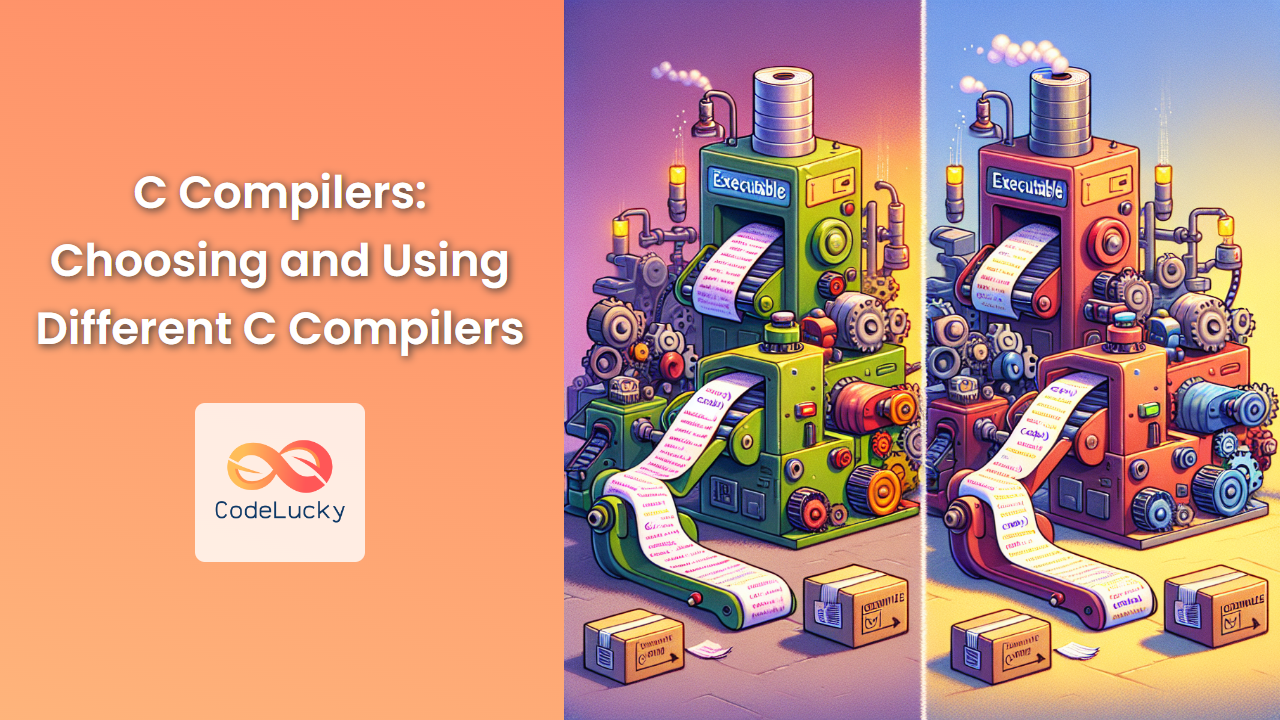C is a powerful and versatile programming language that has stood the test of time. However, with great power comes great responsibility. Writing clean and efficient C code is crucial for creating maintainable, performant, and bug-free software. In this comprehensive guide, we'll explore best practices that will elevate your C programming skills and help you write code that's both elegant and effective.
1. Embrace Consistent Naming Conventions
Consistency in naming is the cornerstone of readable code. In C, it's essential to adopt a naming convention and stick to it throughout your project. Here are some widely accepted practices:
- Use snake_case for variable and function names
- Use UPPERCASE for constants and macros
- Prefix global variables with 'g_'
- Use meaningful and descriptive names
Let's look at an example that demonstrates these conventions:
#include <stdio.h>
#define MAX_BUFFER_SIZE 1024
int g_total_count = 0;
void process_data(char* input_buffer) {
// Function implementation
}
int main() {
char user_input[MAX_BUFFER_SIZE];
// Main function implementation
return 0;
}
In this example, we see consistent use of snake_case for function and variable names, UPPERCASE for the constant MAX_BUFFER_SIZE, and the 'g_' prefix for the global variable g_total_count.
2. Use Meaningful Comments and Documentation
While clean code should be self-explanatory, well-placed comments can significantly enhance code readability and maintainability. Here are some tips for effective commenting:
- Use comments to explain the 'why' rather than the 'what'
- Write function documentation using standardized formats (e.g., Doxygen)
- Keep comments up-to-date with code changes
Let's enhance our previous example with meaningful comments:
#include <stdio.h>
#define MAX_BUFFER_SIZE 1024
int g_total_count = 0; // Keeps track of total processed items
/**
* @brief Processes the input data and updates global count
*
* @param input_buffer Pointer to the input data buffer
* @return void
*/
void process_data(char* input_buffer) {
// Implementation details...
g_total_count++; // Increment the global count after processing
}
int main() {
char user_input[MAX_BUFFER_SIZE];
// Main program loop
while (1) {
// Get user input and process it
// Break the loop if user enters 'quit'
}
return 0;
}
These comments provide context and explain the purpose of functions and variables, making the code more understandable for other developers (or yourself in the future).
3. Optimize Memory Management
Efficient memory management is crucial in C programming. Here are some best practices:
- Always free dynamically allocated memory
- Use stack allocation for small, short-lived objects
- Be cautious with global variables
- Use const for pointers to read-only data
Let's look at an example that demonstrates good memory management practices:
#include <stdio.h>
#include <stdlib.h>
#include <string.h>
#define MAX_NAME_LENGTH 50
typedef struct {
char* name;
int age;
} Person;
Person* create_person(const char* name, int age) {
Person* new_person = (Person*)malloc(sizeof(Person));
if (new_person == NULL) {
return NULL; // Memory allocation failed
}
new_person->name = (char*)malloc(strlen(name) + 1);
if (new_person->name == NULL) {
free(new_person);
return NULL; // Memory allocation failed
}
strcpy(new_person->name, name);
new_person->age = age;
return new_person;
}
void free_person(Person* person) {
if (person != NULL) {
free(person->name);
free(person);
}
}
int main() {
const char* names[] = {"Alice", "Bob", "Charlie"};
int ages[] = {25, 30, 35};
Person* people[3];
for (int i = 0; i < 3; i++) {
people[i] = create_person(names[i], ages[i]);
if (people[i] == NULL) {
printf("Failed to create person %d\n", i);
// Clean up previously allocated memory
for (int j = 0; j < i; j++) {
free_person(people[j]);
}
return 1;
}
}
// Use the people array...
// Clean up
for (int i = 0; i < 3; i++) {
free_person(people[i]);
}
return 0;
}
This example demonstrates several important memory management concepts:
- Dynamic memory allocation with proper error checking
- Use of a separate function to handle memory deallocation
- Cleaning up allocated memory in case of errors
- Consistent freeing of allocated memory at the end of the program
4. Leverage Const Correctness
Using the const keyword appropriately can prevent accidental modifications and provide better optimization opportunities for the compiler. Here's how to use const effectively:
- Use
constfor variables that shouldn't be modified - Use
constfor pointers to read-only data - Use
constfor function parameters that shouldn't be modified
Let's modify our previous example to incorporate const correctness:
#include <stdio.h>
#include <stdlib.h>
#include <string.h>
#define MAX_NAME_LENGTH 50
typedef struct {
char* name;
int age;
} Person;
Person* create_person(const char* name, const int age) {
Person* new_person = (Person*)malloc(sizeof(Person));
if (new_person == NULL) {
return NULL;
}
new_person->name = (char*)malloc(strlen(name) + 1);
if (new_person->name == NULL) {
free(new_person);
return NULL;
}
strcpy(new_person->name, name);
new_person->age = age;
return new_person;
}
void print_person(const Person* person) {
if (person != NULL) {
printf("Name: %s, Age: %d\n", person->name, person->age);
}
}
void free_person(Person* person) {
if (person != NULL) {
free(person->name);
free(person);
}
}
int main() {
const char* names[] = {"Alice", "Bob", "Charlie"};
const int ages[] = {25, 30, 35};
Person* people[3];
for (int i = 0; i < 3; i++) {
people[i] = create_person(names[i], ages[i]);
if (people[i] == NULL) {
printf("Failed to create person %d\n", i);
for (int j = 0; j < i; j++) {
free_person(people[j]);
}
return 1;
}
}
// Print people
for (int i = 0; i < 3; i++) {
print_person(people[i]);
}
// Clean up
for (int i = 0; i < 3; i++) {
free_person(people[i]);
}
return 0;
}
In this updated version:
const char* nameincreate_person()ensures the input string won't be modifiedconst int ageincreate_person()makes it clear that the age value won't be changedconst Person* personinprint_person()indicates that the function won't modify the Person objectconst char* names[]andconst int ages[]inmain()protect the input data from accidental modification
5. Use Appropriate Data Types
Choosing the right data type is crucial for both correctness and efficiency. Here are some guidelines:
- Use
size_tfor sizes and array indices - Use
ptrdiff_tfor pointer arithmetic - Use appropriate integer types (
int8_t,uint32_t, etc.) when you need specific sizes - Use
boolfrom<stdbool.h>for boolean values
Let's modify our example to incorporate these practices:
#include <stdio.h>
#include <stdlib.h>
#include <string.h>
#include <stdint.h>
#include <stdbool.h>
#define MAX_NAME_LENGTH 50
typedef struct {
char* name;
uint8_t age; // Assuming age is always positive and < 256
} Person;
Person* create_person(const char* name, uint8_t age) {
Person* new_person = (Person*)malloc(sizeof(Person));
if (new_person == NULL) {
return NULL;
}
size_t name_length = strlen(name);
new_person->name = (char*)malloc(name_length + 1);
if (new_person->name == NULL) {
free(new_person);
return NULL;
}
memcpy(new_person->name, name, name_length + 1);
new_person->age = age;
return new_person;
}
void print_person(const Person* person) {
if (person != NULL) {
printf("Name: %s, Age: %u\n", person->name, person->age);
}
}
void free_person(Person* person) {
if (person != NULL) {
free(person->name);
free(person);
}
}
bool is_adult(const Person* person) {
return (person != NULL && person->age >= 18);
}
int main() {
const char* names[] = {"Alice", "Bob", "Charlie"};
const uint8_t ages[] = {25, 30, 35};
Person* people[3];
for (size_t i = 0; i < 3; i++) {
people[i] = create_person(names[i], ages[i]);
if (people[i] == NULL) {
printf("Failed to create person %zu\n", i);
for (size_t j = 0; j < i; j++) {
free_person(people[j]);
}
return 1;
}
}
// Print people and check if they're adults
for (size_t i = 0; i < 3; i++) {
print_person(people[i]);
printf("Is adult: %s\n", is_adult(people[i]) ? "Yes" : "No");
}
// Clean up
for (size_t i = 0; i < 3; i++) {
free_person(people[i]);
}
return 0;
}
In this updated version:
- We use
uint8_tfor age, assuming it's always positive and less than 256 - We use
size_tfor array indices and string length - We introduce a
boolfunctionis_adult()to demonstrate the use of boolean values - We use
memcpy()instead ofstrcpy()for potentially better performance
6. Handle Errors Gracefully
Proper error handling is crucial for creating robust C programs. Here are some best practices:
- Always check return values of functions that can fail
- Use errno for system call errors
- Provide meaningful error messages
- Clean up resources in case of errors
Let's enhance our example with better error handling:
#include <stdio.h>
#include <stdlib.h>
#include <string.h>
#include <stdint.h>
#include <stdbool.h>
#include <errno.h>
#define MAX_NAME_LENGTH 50
#define MAX_PEOPLE 3
typedef struct {
char* name;
uint8_t age;
} Person;
Person* create_person(const char* name, uint8_t age) {
if (name == NULL) {
errno = EINVAL;
return NULL;
}
Person* new_person = (Person*)malloc(sizeof(Person));
if (new_person == NULL) {
perror("Failed to allocate memory for person");
return NULL;
}
size_t name_length = strlen(name);
new_person->name = (char*)malloc(name_length + 1);
if (new_person->name == NULL) {
perror("Failed to allocate memory for name");
free(new_person);
return NULL;
}
memcpy(new_person->name, name, name_length + 1);
new_person->age = age;
return new_person;
}
void print_person(const Person* person) {
if (person != NULL) {
printf("Name: %s, Age: %u\n", person->name, person->age);
} else {
fprintf(stderr, "Error: Null person pointer\n");
}
}
void free_person(Person* person) {
if (person != NULL) {
free(person->name);
free(person);
}
}
bool is_adult(const Person* person) {
if (person == NULL) {
errno = EINVAL;
return false;
}
return person->age >= 18;
}
int main() {
const char* names[] = {"Alice", "Bob", "Charlie"};
const uint8_t ages[] = {25, 30, 35};
Person* people[MAX_PEOPLE] = {NULL};
for (size_t i = 0; i < MAX_PEOPLE; i++) {
people[i] = create_person(names[i], ages[i]);
if (people[i] == NULL) {
fprintf(stderr, "Failed to create person %zu\n", i);
// Clean up previously allocated memory
for (size_t j = 0; j < i; j++) {
free_person(people[j]);
}
return EXIT_FAILURE;
}
}
// Print people and check if they're adults
for (size_t i = 0; i < MAX_PEOPLE; i++) {
print_person(people[i]);
if (is_adult(people[i])) {
printf("Is adult: Yes\n");
} else {
if (errno == EINVAL) {
fprintf(stderr, "Error: Invalid person data\n");
} else {
printf("Is adult: No\n");
}
}
}
// Clean up
for (size_t i = 0; i < MAX_PEOPLE; i++) {
free_person(people[i]);
}
return EXIT_SUCCESS;
}
This version includes several improvements in error handling:
- We check for NULL input in
create_person()and seterrnoaccordingly - We use
perror()to print system error messages - We handle potential errors in
print_person()andis_adult() - We use
EXIT_SUCCESSandEXIT_FAILUREfor more meaningful program exit codes
7. Use Appropriate Control Structures
Choosing the right control structures can make your code more readable and efficient. Here are some tips:
- Use
forloops when the number of iterations is known - Use
whileloops for conditional iteration - Prefer
switchstatements over long if-else chains for multiple conditions - Use early returns to reduce nesting and improve readability
Let's modify our example to demonstrate these principles:
#include <stdio.h>
#include <stdlib.h>
#include <string.h>
#include <stdint.h>
#include <stdbool.h>
#include <errno.h>
#define MAX_NAME_LENGTH 50
#define MAX_PEOPLE 3
typedef struct {
char* name;
uint8_t age;
} Person;
Person* create_person(const char* name, uint8_t age) {
if (name == NULL) {
errno = EINVAL;
return NULL;
}
Person* new_person = (Person*)malloc(sizeof(Person));
if (new_person == NULL) {
perror("Failed to allocate memory for person");
return NULL;
}
size_t name_length = strlen(name);
new_person->name = (char*)malloc(name_length + 1);
if (new_person->name == NULL) {
perror("Failed to allocate memory for name");
free(new_person);
return NULL;
}
memcpy(new_person->name, name, name_length + 1);
new_person->age = age;
return new_person;
}
void print_person(const Person* person) {
if (person == NULL) {
fprintf(stderr, "Error: Null person pointer\n");
return;
}
printf("Name: %s, Age: %u\n", person->name, person->age);
}
void free_person(Person* person) {
if (person == NULL) {
return;
}
free(person->name);
free(person);
}
const char* get_age_category(uint8_t age) {
switch (age / 10) {
case 0:
case 1:
return "Child";
case 2:
return "Young Adult";
case 3:
case 4:
return "Adult";
case 5:
case 6:
return "Middle-aged";
default:
return "Senior";
}
}
int main() {
const char* names[] = {"Alice", "Bob", "Charlie"};
const uint8_t ages[] = {25, 30, 35};
Person* people[MAX_PEOPLE] = {NULL};
for (size_t i = 0; i < MAX_PEOPLE; i++) {
people[i] = create_person(names[i], ages[i]);
if (people[i] == NULL) {
fprintf(stderr, "Failed to create person %zu\n", i);
// Clean up previously allocated memory
while (i > 0) {
free_person(people[--i]);
}
return EXIT_FAILURE;
}
}
// Print people and their age categories
for (size_t i = 0; i < MAX_PEOPLE; i++) {
print_person(people[i]);
printf("Age category: %s\n", get_age_category(people[i]->age));
}
// Clean up
for (size_t i = 0; i < MAX_PEOPLE; i++) {
free_person(people[i]);
}
return EXIT_SUCCESS;
}
In this updated version:
- We use early return in
print_person()andfree_person()for better readability - We introduce a
switchstatement inget_age_category()to demonstrate its use for multiple conditions - We use a
whileloop for cleanup in the error case inmain(), demonstrating its use for conditional iteration
8. Optimize for Performance
While clean code is important, performance is often crucial in C programming. Here are some tips to optimize your C code:
- Use const and static when appropriate to allow compiler optimizations
- Prefer stack allocation over heap allocation for small objects
- Use inline functions for small, frequently called functions
- Be mindful of cache coherence and data alignment
Let's optimize our example:
#include <stdio.h>
#include <stdlib.h>
#include <string.h>
#include <stdint.h>
#include <stdbool.h>
#include <errno.h>
#define MAX_NAME_LENGTH 50
#define MAX_PEOPLE 3
typedef struct {
char name[MAX_NAME_LENGTH];
uint8_t age;
} Person;
static inline bool create_person(Person* person, const char* name, uint8_t age) {
if (person == NULL || name == NULL || strlen(name) >= MAX_NAME_LENGTH) {
errno = EINVAL;
return false;
}
strncpy(person->name, name, MAX_NAME_LENGTH - 1);
person->name[MAX_NAME_LENGTH - 1] = '\0';
person->age = age;
return true;
}
static inline void print_person(const Person* person) {
if (person == NULL) {
fprintf(stderr, "Error: Null person pointer\n");
return;
}
printf("Name: %s, Age: %u\n", person->name, person->age);
}
static inline const char* get_age_category(uint8_t age) {
switch (age / 10) {
case 0:
case 1:
return "Child";
case 2:
return "Young Adult";
case 3:
case 4:
return "Adult";
case 5:
case 6:
return "Middle-aged";
default:
return "Senior";
}
}
int main() {
const char* names[] = {"Alice", "Bob", "Charlie"};
const uint8_t ages[] = {25, 30, 35};
Person people[MAX_PEOPLE];
for (size_t i = 0; i < MAX_PEOPLE; i++) {
if (!create_person(&people[i], names[i], ages[i])) {
fprintf(stderr, "Failed to create person %zu\n", i);
return EXIT_FAILURE;
}
}
// Print people and their age categories
for (size_t i = 0; i < MAX_PEOPLE; i++) {
print_person(&people[i]);
printf("Age category: %s\n", get_age_category(people[i].age));
}
return EXIT_SUCCESS;
}
In this optimized version:
- We use a fixed-size array for the name in the
Personstruct, eliminating the need for dynamic memory allocation - We make
create_person,print_person, andget_age_categoryinline functions for potential performance improvements - We use stack allocation for the
peoplearray, which is faster and doesn't require manual memory management - We use
strncpywith a manual null terminator to ensure the name is always null-terminated
Conclusion
Writing clean and efficient C code is a skill that develops over time. By following these best practices, you can create C programs that are not only functional but also maintainable, readable, and performant. Remember that these guidelines are not rigid rules, but rather principles that should be applied judiciously based on the specific requirements of your project.
As you continue to write C code, always strive for clarity and simplicity. Regularly review and refactor your code, and don't hesitate to seek feedback from peers. With practice and attention to detail, you'll find yourself naturally writing C code that is both elegant and efficient.
Happy coding! 🖥️💻🚀



